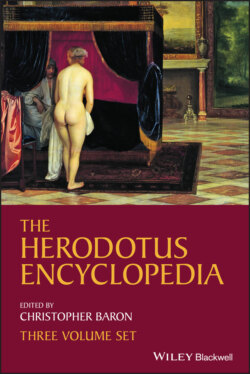Читать книгу The Herodotus Encyclopedia - Группа авторов - Страница 215
AGORA (ἀγορή, ἡ)
ОглавлениеMATHIEU DE BAKKER
University of Amsterdam
A meeting‐place where citizens gather for the purpose of political, commercial, religious‐ceremonial, judicial, social and/or sportive activities. In early Greek history the agora appears to have had a practical function as “the place where one gathers” for political or military purposes. In the course of the ARCHAIC AGE, Greek CITIES began to demarcate their agora and make it into an open space. In some places (e.g., ATHENS, CORINTH) remains of racing tracks testify to its sportive and ceremonial function. In the classical era the commercial use of the agora had become prominent. The squares were increasingly surrounded with monumental porticoes and other buildings with a religious and/or political function.
Herodotus mentions the agora occasionally, most often in the case of Greek poleis. As for its monumental layout, he mentions the buildings made of Parian marble at SIPHNOS (3.57.3–4) and refers to statues and shrines of local HEROES in METAPONTUM (4.15.4), SICYON (5.67.1), and Athens (5.89.3). In Herodotus’ eyes, the agora defines Greekness. He observes that Egyptians may sell the remains of their SACRIFICES on a Greek agora if it happens to be available (2.39.2), and the typically Greek behavior of the philhellene Scythian king SCYLES is described as “walking around in public on the agora” (ἀγοράζειν, 4.78.4). Furthermore, he makes the Persian king CYRUS (II) condescendingly refer to the agora as a place where the Greeks “gather and cheat one another under OATH” (1.153.1). The agora indeed functions as a backdrop of deceit in the case of the war of the Lydian king ALYATTES against the Milesians, who use it to pretend that the SIEGE leaves the city unaffected (1.21). PEISISTRATUS, too, uses the agora to trick the Athenians into believing that he has been wounded by his adversaries (1.59.4). Although Herodotus considers the agora a typically Greek phenomenon, he also mentions its existence in the case of other peoples that have taken to TRADE, like the LYDIANS (SARDIS: 1.37.2; 5.101.2), BABYLONIANS (1.197), and PHOENICIANS (7.23.4).
SEE ALSO: Acropolis; Agora (Hellespontine Chersonese); Deception; Hellas; polis
